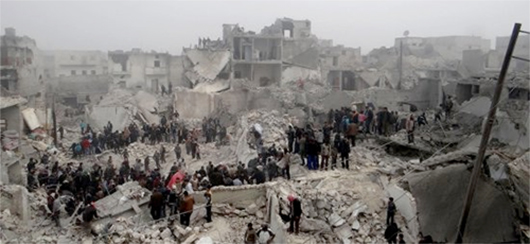 08.September 2015 – An op-ed co-signed by Karim Lahidji, the Arab Reform Initiative, and several Syrian NGOs published on the occasion of an international conference organised by the French Foreign Ministry on the protection of victims of ethnic or religious violence in the Middle East.
08.September 2015 – An op-ed co-signed by Karim Lahidji, the Arab Reform Initiative, and several Syrian NGOs published on the occasion of an international conference organised by the French Foreign Ministry on the protection of victims of ethnic or religious violence in the Middle East.
The dead bodies of Syrian children fleeing the war have reached European shores despite all efforts to prevent them. Europe is now being forced to take account of the human drama that is playing out on its doorstep and the heavy responsibility this implies.
As discriminatory reception procedures prioritising Christian refugees are being put in place by several European countries, such as Slovakia, Poland and Belgium, the French authorities organised an international conference on the protection of victims of ethnic or religious violence in the Middle East on 8 September 2015. Along with their political partners, the French government has a responsibility to denounce these selective reception policies and the manipulation of religious divisions by States.
The hardening of religious divisions and increase in sectarian violence, whose victims are for the greater part Sunni (this goes for the victims of ISIS as well), are effectively among the principal threats in the region. To fight these phenomena, governments must not respond with a policy of selective support of refugees. Such an approach would stand in contradiction to European universalism, particularly given the unprecedented level of violence and the fact that this violence affects the population of the region as a whole.
In addition to benefiting the Assad regime (which still dares to paint itself as the protector of minorities in the face of radical islamists) by distracting from the crimes it has committed against the entire population, such an approach would also be dangerous for the religious communities themselves. By worsening the lines of fracture between the different components of Syrian society, by stigmatising certain religious groups and by associating them with certain foreign interests, efforts to integrate these “minorities” in their geographical and historical context would be threatened. However, their integration remains the only real way to protect them in the long run.
Taking this approach would also send a catastrophic message to victims of the conflict and of the murderous policies of the destructive Assad regime belonging to the “religious majority.” It would end up pushing that majority into the arms of ISIS, as if to say : “You don’t deserve our protection, go make a pact with the jihadists.” In summary, by adopting the same sectarian logic as the Islamic State, we would risk rooting ISIS fully in the Syrian context, something it has not yet succeeded in doing.
“The Syrian people are one” was one of the first slogans of the Syrian revolution. It was based on the demand for equal rights to citizenship, a right has been denied for decades by the Assad regime. Acting against sectarian or confessional crimes committed by the Syrian regime, ISIS and the shiite militias that have pounded Syria and Iraq implies grasping the responsibility of the States that promote these crimes, notably Iran and Saudi Arabia. It also implies defending the concept of citizenship while eschewing the old colonial recipes founded on the instrumentalisation of local particularities and of religious minorities.
If there is one distinction to make, it is between those responsible for international crimes, such as Bashar al Assad, but also ISIS, and the civilian population who are their victims.
Under the current circumstances, the most urgent political act is to open European borders to refugees, to guarantee their unconditional and dignified reception, without discriminating among them on the basis of ethnicity or religion; to support those Syrians who continue to promote tolerance and pluralism with extraordinary courage, everyday; and to convince Russia and China to allow the UN Security Council to refer the situation to the International Criminal Court (ICC) and to defer to the ICC regarding the results of the UN commissions of investigation.
Signed:
Karim Lahidji , FIDH President
Basma Kodmani, Director of the Arab Reform Initiative
Fadi Dayoub, International Coordinator at LDSPS (Local development and small-projects support)
Bassam Al Ahmad, Spokesperson for VDC (Violation Documentation Center); Salam Kawakibi, President of Initiative for a New Syria
